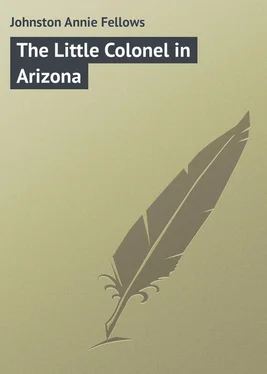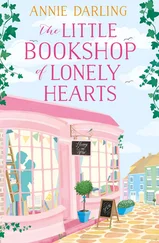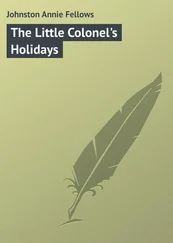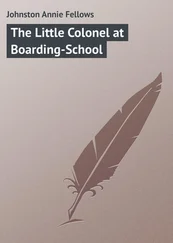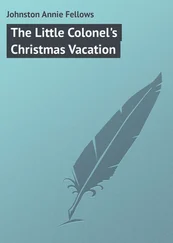Annie Johnston - The Little Colonel in Arizona
Здесь есть возможность читать онлайн «Annie Johnston - The Little Colonel in Arizona» — ознакомительный отрывок электронной книги совершенно бесплатно, а после прочтения отрывка купить полную версию. В некоторых случаях можно слушать аудио, скачать через торрент в формате fb2 и присутствует краткое содержание. Жанр: foreign_prose, foreign_adventure, на английском языке. Описание произведения, (предисловие) а так же отзывы посетителей доступны на портале библиотеки ЛибКат.
- Название:The Little Colonel in Arizona
- Автор:
- Жанр:
- Год:неизвестен
- ISBN:нет данных
- Рейтинг книги:3 / 5. Голосов: 1
-
Избранное:Добавить в избранное
- Отзывы:
-
Ваша оценка:
- 60
- 1
- 2
- 3
- 4
- 5
The Little Colonel in Arizona: краткое содержание, описание и аннотация
Предлагаем к чтению аннотацию, описание, краткое содержание или предисловие (зависит от того, что написал сам автор книги «The Little Colonel in Arizona»). Если вы не нашли необходимую информацию о книге — напишите в комментариях, мы постараемся отыскать её.
The Little Colonel in Arizona — читать онлайн ознакомительный отрывок
Ниже представлен текст книги, разбитый по страницам. Система сохранения места последней прочитанной страницы, позволяет с удобством читать онлайн бесплатно книгу «The Little Colonel in Arizona», без необходимости каждый раз заново искать на чём Вы остановились. Поставьте закладку, и сможете в любой момент перейти на страницу, на которой закончили чтение.
Интервал:
Закладка:
"Oh, I wish it was to-morrow," she exclaimed, "and we had all our supplies bought so that we could begin."
"So do I," answered Jack. "But it's nearly sundown now, and the supper-bell will be ringing before we get back to the ranch, if we don't start soon."
"Well, lock the doors, and we'll go," said Joyce, beginning to pin on her hat.
"Oh, what's the use of being so particular! Mrs. Lee says everybody is honest out in this country. They never turn a key on the ranch, and they've never had anything taken either by Mexicans or Indians in all the years they've lived here. It isn't half as wild as I hoped it would be. I wish I could have been a pioneer, and had some of the exciting times they had."
Nevertheless, Jack barred the back door and locked the front one, before following Joyce across the yard, and over the little bridge spanning the irrigating canal, into the public road. They stood there a moment, looking back at the house, just one big square adobe room, with a shed-kitchen in the rear. Around three sides of it ran a rough sort of porch or shack, built of cottonwood posts, supporting a thatch of bamboo-stalks and palm-leaves. While it would afford a fine shelter from the sun in the tropical summer awaiting them, it was a homely, primitive-looking affair, almost as rough in its appearance as if Robinson Crusoe himself had built it.
"It's hopeless, isn't it!" said Joyce, with a despairing shake of the head. "No matter how homelike we may make it inside, it will always be the picture of desolation outside."
"Not when the leaves come out on that row of umbrella-trees," answered Jack. "Mrs. Lee says they will be so green and bushy that they will almost hide the house, and the blossoms on them in the spring are as purple and sweet as lilacs. Then this row of fig-trees along the road, and the clump of cottonwoods back of the house, and those two big pepper-trees by the gate will make it cool and shady here, no matter how scorching hot the desert may be. We'll have to give them lots of water. Oh, that reminds me, I'll have to have a pair of rubber boots, if I am to do the irrigating. The water will be in again day after to-morrow."
Joyce groaned as she opened the book she was carrying, and added boots to the long list on the fly-leaf. "What a lot it's going to take to get us started. Crusoe certainly had reason to be thankful for the shipwrecked stores he found."
"But it'll cost less to get the boots than to hire a Mexican every eight days to do the irrigating," said Jack.
Following the road beside the canal, they walked along in the last rays of the sunset, toward the ranch. Birds twittered now and then in the fig-trees on their right, or a string of cows went lowing homeward through the green alfalfa pastures, to the milking. The road and canal seemed to run between two worlds, for on the left it was all a dreary desert, the barren sands stretching away toward the red buttes and old Camelback Mountain, as wild and cheerless as when the Indians held possession. Some day it too would "rejoice and blossom like the rose," but not until a network of waterways dug across it brought it new life.
Once as they walked along, a jack-rabbit crossed their path and went bounding away in a fright. A covey of quail rose with a loud whirr of wings from a clump of bushes beside the road, but they met no human being until Holland and Mary, just from school, came racing out from the ranch to meet them with eager questions about the new home.
Chris, the Mexican, had made the round of the tents, building a little fire of mesquite wood in each tiny drum stove, for in February the air of the desert grows icy as soon as the sun disappears. Mrs. Ware was sitting in a rocking-chair between the stove and table, on which stood a lamp with a yellow shade, sending a cheerful glow all over the tent. Joyce took the remaining chair, Jack sat on the wood-box, and Mary, Norman and Holland piled upon the bed, to take part in the family conclave. The canvas curtain had been dropped over the screen-door, and the bright Indian rugs on the floor gave a touch of warmth and cosiness to the tent that made it seem wonderfully bright and homelike.
"I don't see," said Mary, when she had listened to a description of the place, "how we are all going to eat and sleep and live in one room and a kitchen. It takes three tents to hold us all here, besides having the ranch dining-room to eat in. What if Eugenia Forbes should come from the Waldorf-Astoria to visit us, or the Little Colonel, or some of the other girls from Kentucky, that you knew at the house-party, Joyce? Where would they sleep?"
"Yes," chimed in Holland, teasingly, "or the Queen of Sheba? Suppose she should come with all her train. It's about as likely. We would have to play 'Pussy wants a corner' all night, Mary, and whoever happened to be 'it' would have to sit up until he happened to find somebody out of his corner."
"Goosey!" exclaimed Mary, sticking out her tongue at him and making the worst face she could screw up. "Honestly, what would we do, Joyce?"
"We're not going to try to live in just one room," explained Joyce. "The doctor said mamma ought to sleep in a tent, so we'll get a big double one like this, wainscoted up high, with floor and screen-door, just like this. Mamma and you and I can use that, and the boys will have just an ordinary camping-tent, without door or floor. They have been so wild to be pioneers that they will be glad to come as near to it as possible, and that means living without extra comforts and conveniences. In the house one corner of the room will be the library, where we'll put papa's desk, and one corner will be the sewing-room, where we'll have the machine, and one will be a cosy corner, with the big lounge and lots of pillows. If the Queen of Sheba or the Little Colonel should do such an improbable thing as to stray out here, we'll have a place for them."
"There goes the supper-bell," cried Norman, scrambling down from the bed in hot haste to beat Mary to the table. Joyce waited to turn down the lamp, close the stove draughts, and bring her mother's shawl, before following them.
"How bright the camp looks with a light in every tent," she said, as they stepped out under the stars. "They look like the transparencies in the torchlight processions, that we used to have back in Plainsville."
Mrs. Ware's tent was in the front row, so it was only a step to the door of the dining-room in the ranch house. The long table was nearly filled when they took their seats. Gathered around it were people who had drifted there from all parts of the world in search of lost health. A Boston law-student, a Wyoming cowboy, a Canadian minister, a Scotchman from Inverness, and a jolly Irish lad from Belfast were among the number.
The most interesting one to Joyce was an old Norwegian who sat opposite her, by the name of Jan Ellestad. Not old in years, for his hair was still untouched by gray, and his dark eyes flashed at times with the spirit of the old vikings, when he told the folk-lore of his fatherland. But he was old in sad experiences, and broken health, and broken hopes. The faint trace of a foreign accent that clung to his speech made everything he said seem interesting to Joyce, and after Mrs. Lee had told her something of his history, she looked upon him as a hero. This was the third winter he had come back to the ranch. He knew he could not live through another year, and he had stopped making plans for himself, but he listened with unfailing cheerfulness to other people's. Now he looked up expectantly as Joyce took her seat.
"I can see by your face, Miss Joyce," he said, in his slow, hesitating way, as if groping for the right words, "that you are about to plunge this ranch into another wild excitement. What is it now, please?"
"Guess!" said Joyce, glancing around the table. "Everybody can have one guess."
Читать дальшеИнтервал:
Закладка:
Похожие книги на «The Little Colonel in Arizona»
Представляем Вашему вниманию похожие книги на «The Little Colonel in Arizona» списком для выбора. Мы отобрали схожую по названию и смыслу литературу в надежде предоставить читателям больше вариантов отыскать новые, интересные, ещё непрочитанные произведения.
Обсуждение, отзывы о книге «The Little Colonel in Arizona» и просто собственные мнения читателей. Оставьте ваши комментарии, напишите, что Вы думаете о произведении, его смысле или главных героях. Укажите что конкретно понравилось, а что нет, и почему Вы так считаете.
